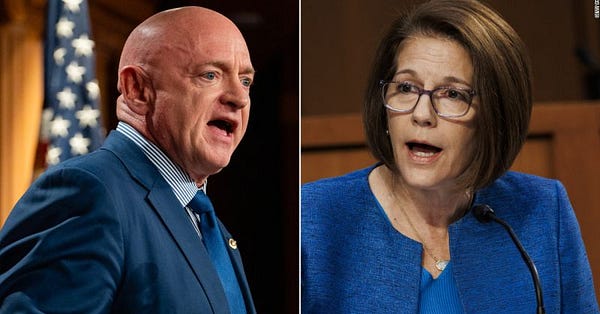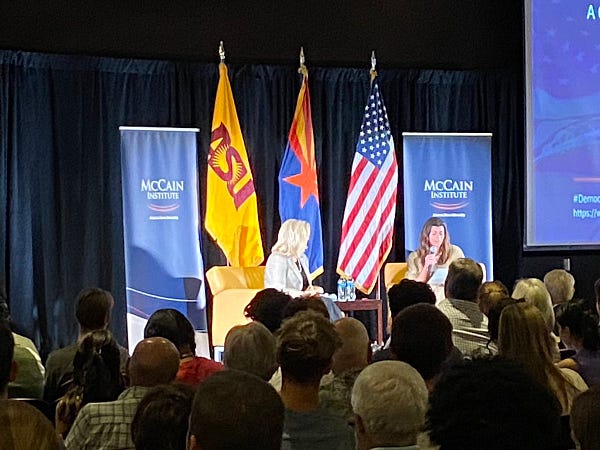Destabilized Saturday Edition #38
American democracy on the precipice, never change Boston, Biden "regime" and permission to radicalize, electric trucks taking over
It hit me the other day how much is at stake in the 2022 elections. I already knew this, of course, but I think I’d been keeping at arms length emotionally.
We’re in an era, unfortunately, where every election has existential stakes. It’s an inevitable consequence of one party in a two-party system being controlled by a semi-fascist super majority faction. There’s not much new to say about this, but I want to point out two recent polls that made my blood run cold.


Finchem and Marchant are both election deniers who, if they win, will be in charge of overseeing 2024 elections in two of the 7-8 key swing states. Here’s Finchem recently:
Time’s Charlotte Alter: If Biden wins Arizona in 2024, she asked, would you certify that result as secretary of state?
Finchem chuckled.
“If the law is followed, and legitimate votes have been counted, and Joe Biden ends up being the winner,” he replied. “I’m required under the law – if there’s no fraud – to certify the election.”
Then he added, “I think you’re proposing something that, quite frankly, is a fantasy.”
Here’s a plausible electoral map in 2024: Democrats with 260 electoral votes, Republicans with 261, and Arizona and Nevada holding the deciding votes.
There are better and worse 2024 scenarios than this, but this one isn’t far fetched. We could play the electoral college permutations game for hours, but the bottom line is American democracy could suffer a near-fatal wound one month from now. We would still have some hope of reversing a slide into authoritarianism, but if the elected officials who certify presidential results in swing states simply won’t certify a Democratic victory, the path for democracy to persist becomes much narrower (and the road to stopping climate change gets longer).
Let’s hope Americans’ better angels prevail in November and these polls turn out to have underestimated a nascent pro-democracy coalition.
[Vote]
My Work
Politicians naturally responded to the changing political context within their parties:
Between the 1960s and the 1980s, Democratic presidential candidates from Lyndon Johnson and Hubert Humphrey to Walter Mondale and Michael Dukakis championed civil rights legislation and social welfare programs to combat racial and economic inequality, while Republican presidential candidates from Barry Goldwater and Richard Nixon to Ronald Reagan and George H. W. Bush courted racially and economically conservative white voters with subtle and not-so-subtle appeals to racial fears and prejudice, and with opposition to social welfare programs that many working-class whites increasingly saw as primarily benefiting nonwhites.
The rational choices of politicians reinforced the evolution of the major party coalitions, continuing the flow of more liberal and racially diverse voters toward the Democratic Party and more conservative white voters toward the Republican Party.
Interesting Reads
OPEC May Have Just Ended the US-Saudi Alliance
One can like cold realpolitik decision-making or not. But in realpolitik terms, the U.S.-Saudi alliance used to make a lot of sense. The Saudis needed the US, despite our cultural worlds apart. The US needed them. The Saudis operated for the U.S. as the custodians of the price stability of the global oil supply. They also provided financial support to other U.S. regional allies. We wanted them to provide a steadying hand in relations between Israel and the Arab states. The truth is that both countries now need each other considerably less than in the past. But the Saudis are acting mostly like the relationship is over even though the U.S. mainly is not. Perhaps it’s better to say they are seeing it in purely transactional terms, with very short term clearing of accounts. They are playing hardball with us but we’re not with them.
Tweets of the Week




Extreme Weather Watch


Creeping Authoritarianism Watch





Progress Joy and Hope















